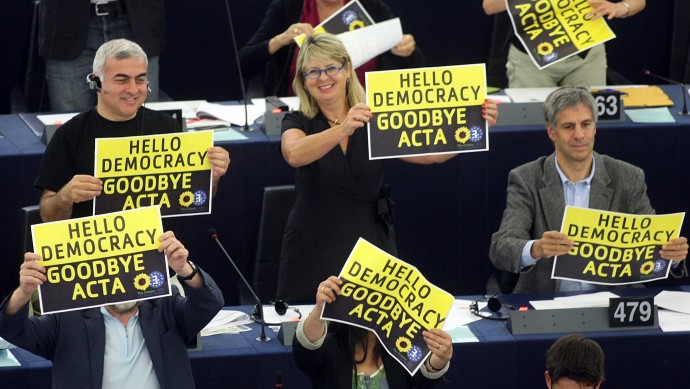
(BRUSSELS) – On July 4, the European Parliament (EP) rejected the Anti-Counterfeiting Trade Agreement (ACTA) 478-39 with 165 abstentions, dealing a blow, probably fatal, to the treaty whose stated aim is to enhance international cooperation in the fight against Intellectual Property Rights infringements, namely counterfeit goods and online trafficking in copyrighted intellectual material. In other words, ACTA is a more international version of the U.S. Stop Online Piracy Act (SOPA) and the Protect Intellectual Property Act (PIPA) and the latest such text to fall foul of public opinion.
Negotiations on the ACTA were launched in June 2008 between Australia, Canada, the European Union, Japan, South Korea, Mexico, Morocco, New Zealand, Singapore, Switzerland and the United States and were finalized in November 2011. All parties, except Switzerland and Mexico have signed it, but the signatures need to be followed by ratifications for the treaty to enter into force. Its rejection by the EP means that neither the EU nor its individual member states can join the agreement.
It is the first time ever that the European Parliament has blocked ratification of an international agreement, revealing the extent of the opposition to ACTA. When it was made public earlier this year, thousands of people took to the streets in several parts of Europe to protest. They were mainly concerned that free downloading of movies and music might lead to prison sentences if ACTA were ratified. They also feared that exchanging material on the Internet may become a crime and said the accord would allow for massive online surveillance. The EP received several petitions, including one signed by 2.8 million people from all over the world because of concerns over Internet freedom.
Governments themselves are now starting to backtrack: The Dutch government revealed on June 26 that it would not ratify the ACTA regardless of the European Parliament’s vote; Australia’s parliament has deterred ratification; and the U.S. Congress is divided as to whether ratify the treaty.
The European Parliament does not dispute the stated objective of the agreement, but the way in which it is executed: MEPs do feel there is a need to standardize international laws that protect the rights of those who produce music, films, pharmaceuticals, fashion goods and other products that often are the targets of piracy and intellectual property theft. But they also fear the treaty as it stands could lead to censorship and a loss of privacy on the Internet; they criticize the ambiguous language regarding the reach of criminal sanctions and the role of Internet service providers.
“Given the vagueness of certain aspects of the text and the uncertainty over its interpretation, the EP cannot guarantee adequate protection for citizen’s rights,” David Martin, the MEP responsible for steering the ACTA through the European Parliament said. “The intended benefits of this international agreement are far outweighed by the potential threats to civil liberties,” he concluded.
The same conclusion was reached by the European Data Protection Supervisor, an independent supervisory authority devoted to protecting personal data and privacy in the EU institutions. In an opinion on ACTA released last April, he states that “the lack of precision of the agreement about the measures to be deployed to tackle infringements of Intellectual Property Rights on the Internet may have unacceptable side effects on fundamental rights of individuals.” Adding, “Many of the measures would involve the large scale monitoring of users’ behavior and of their electronic communications. These measures are highly intrusive to the private sphere of individuals and, if not implemented properly, may therefore interfere with their rights and freedoms to, inter alia, privacy, data protection and the confidentiality of their communications.”
Others have welcomed the Parliament’s decision over more specific concerns. Oxfam, an international development and humanitarian organization, believes ACTA would pose a serious threat to poor people’s access to generic medicines.
“ACTA would have limited the legitimate movement of generic medicines by making companies producing affordable drugs subject to criminal prosecutions and having their medicines seized,” Leïla Bodeux, Oxfam’s spokesperson said after the vote in the European Parliament.
As for artists, they are divided between those who defend the agreement as necessary to allow artists to earn income when their work is used and others who consider intellectual property laws as clearly outdated in the Internet age.
The European Commission and industry groups in Europe had tried to defend the agreement by arguing that Intellectual Property protection plays a critical role in driving growth, innovation, development and jobs and that ACTA was essential for business operating globally. They published statements intent to fend off what they call “unjustified accusations.” In its document, the European Commission explains that “ACTA is not about checking or monitoring private communication on the Internet,” that “it will not censor websites” and “that it is not about how individual citizens use the Internet.” On the medicines front, it claims that “there are no provisions in ACTA that could directly or indirectly affect the legitimate trade in generic medicines or more broadly, global public health.”
The apparent contradiction between different opinions clearly shows how difficult it can be to interpret a text essentially characterized by its lack of clarity and various layers of ambiguity; additionally, several provisions in the text start with, “The Parties may provide that…”. This leaves it unclear as to whether countries will adopt the measures or not, and if yes, to what extent. When fundamental rights are at stake though, ambiguity should be avoided.
After the vote in the European Parliament, most observers here in Brussels are of the opinion that ACTA will not survive. The European Commission, though, remains defiant about its wish to salvage the treaty. In any case, SOPA, PIPA and ACTA reveal a clear tendency by governments all over the world to increasingly control Internet to the detriment of individual rights. The general public and their representatives may do well to watch closely for any future attempts to reintroduce similar bills or treaties, perhaps in a more disguised form.


